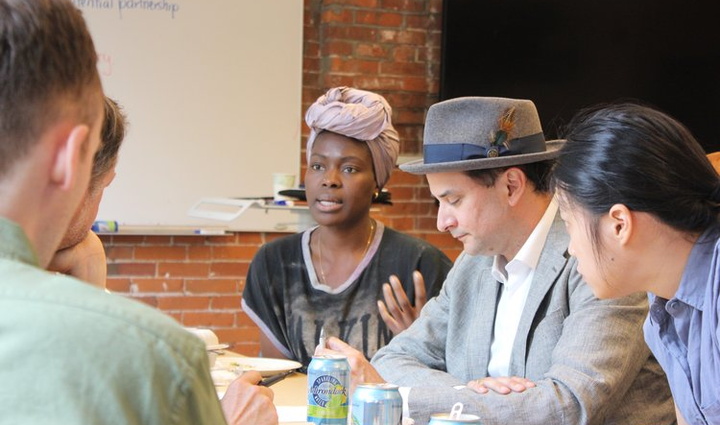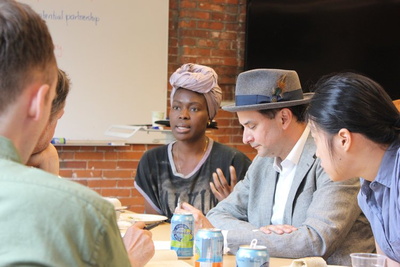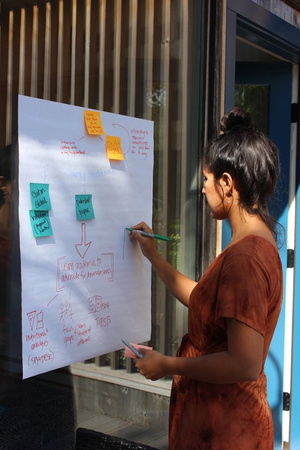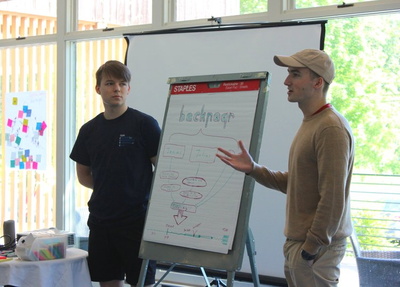A Focus on Community: Catching up with Three Summer Fellowship Teams
This summer, ten teams are spending eight intensive weeks with Tsai CITY, working on their ventures and projects as part of the 2019 Summer Fellowship.

We’ll be following along as the teams sprint through the program, sharing their goals and experiences. This week, we’re taking a look at three teams that are building platforms or spaces with a focus on community and connection.
Noir Fest

Lolade Siyonbola, a recent graduate of Yale’s master’s program in African Studies, moved from Nigeria to Missouri as a kid. As she and her family adjusted to their new surroundings, one constant was the classic films her family would gather to watch. “Film was a really big part of my immigrant child experience,” she says. As Siyonbola got older, she noticed that there weren’t creative spaces for audiences to access films that reflected their cultures. In college and then while living in New York, she began hosting events to address this gap, from informal screenings at community centers to sold-out screenings and panel discussions with partner organizations. A desire to deepen her knowledge brought her to Yale, where she applied insights from her academic work to leading events like the Yale Africa Film Festival and began to develop a broader vision for her film screenings’ impact. From her very first events, she had been struck by the audience response: “People were so moved by the experience and wanted more,” she recalls. “I knew this was something that needed to keep happening — it was just a question of how to make that happen.”
With NOIR FEST, she’s aiming to answer that question. Siyonbola and her collaborators are currently building a traveling film festival that will bring together feature-length and short films with potential art exhibits, digital components, and social events, creating a robust community-building experience. “It’s about creating a platform for filmmakers from across the black diaspora to showcase visionary and aspirational films,” she says, explaining that she hopes to share black narratives that move beyond common tropes in mainstream American movies. “There’s so much amazing content out there,” she says, noting that she’s seen that a desire for interesting, high-quality films can bring together people of all backgrounds. “Why can’t we bring this to audiences around the country?”
As part of her work to scale NOIR FEST to a national (and, she hopes, eventually a global) level, Siyonbola joined this spring’s Accelerator at CITY, and she’s continuing her progress through the Summer Fellowship. Over the Fellowship’s eight weeks, one of her primary goals is to develop meaningful partnerships in cities around the country. “It’s really about partnerships,” she says, pointing to institutions and public figures doing interesting work on representation and storytelling, from institutions like Harlem’s Studio Museum to filmmakers like Ava DuVernay, and adding, “We want to be in conversation with those people.” Siyonbola and her collaborators envision their work being more than just a film festival — they hope to build an ecosystem for connections and discussions that last beyond the screenings themselves. Ultimately, Siyonbola says, “We hope to drive a new conversation about positive images and positive futures for black people across the globe.”
Dream Kit

Driving a new conversation is also a priority for Marina Marmolejo, who’s working on DreamKit: a digital platform for youth experiencing homelessness to catalogue their experiences, connect with local mentorship and employment opportunities, and collect points that can be used as currency to address immediate needs like food and hygiene products. Marmolejo grew up in Los Angeles, where homelessness is a pervasive issue. Early experiences volunteering, taking courses on the issue, and spending time on LA’s Skid Row ultimately led her to the Yale School of Public Health, where she set out to continue exploring the intersection of public health and homelessness. In her two years at Yale, she conducted research with New Haven’s Downtown Evening Soup Kitchen and LA’s Safe Place for Youth, helped lead the New Haven P.A.W.S. Project, and wrote her master’s thesis on food insecurity and youth homelessness.
Last summer’s K2 poisonings on the New Haven Green served as a catalyst for her next step — launching the project that would become DreamKit. Following the events on the Green, Yale School of Public Health assistant professor Yusuf Ransome found himself wondering how he could contribute, and he and Marmolejo connected with Roberta Hoskie, who was interested in building a transitional house for homeless teens. They quickly realized, however, that they had no effective way of gathering data on their stakeholders’ needs, or iterating on their ideas in response to these needs. “Right now, technology is extremely underutilized in homelessness services — and if it is used, it’s often really siloed,” says Marmolejo. With this insight, the team took a step back and coalesced around a new concept: a mobile app that would create a “living resume” for homeless youth, helping them track and demonstrate their engagements with social workers, shelters, and other resources. “We wanted to enable youth to take ownership of their lived experience,” explains Marmolejo. As they’ve developed the app, the immediate needs of youth experiencing homelessness have informed additional components — namely, tying these engagements to points (which can be used as money at local vendors) and connecting homeless youth to mentors based on shared interests.
For Marmolejo, creating an app is a new challenge. She’s been building skills through programs like Tsai CITY’s spring Intensive, Paper to Prototype: App Design Basics, and learning from others along the way. As the team works on building out the first iteration of the app, they’re also spending the summer continuing to fortify and expand partnerships in New Haven and beyond. “Trust-building doesn’t take one meeting,” Marmolejo notes as she describes the essential, ongoing work of learning from service providers, researchers, case workers, and young people experiencing homelessness themselves. “It’s been exhausting and energizing all at the same time.” In the next few weeks, Marmolejo plans to hold focus groups at New Haven’s public library, gathering feedback on the app’s wireframes from potential users. She is also working with a cohort of youth to test the basic mechanism of the points concept with a lo-fi version of the app, in which points can be redeemed for gift cards that she and her team will distribute. This kind of testing and feedback-gathering — hearing directly from the young people that will eventually use DreamKit , and centering their perspectives in the app’s design — is her top priority. “A big goal this summer,” she says, “is collecting both qualitative and quantitative data to understand how to improve DreamKit for future users.”
Backpaqr

While Marmolejo gets DreamKit off the ground in New Haven this summer, the team behind another venture, Backpaqr, is using their hometown of Vilnius, Lithuania, as the first stop on what they hope will be a global endeavor. The Backpaqr team — Yale College student Jonas Kavaliauskas, NYU student Julius Nedzinskas, and recent Cambridge graduate Paulius Asvydis — is currently building a website and app they hope will connect young travelers with locals, offering authentic adventures as well as fully planned alternative trips.
It’s an idea deeply rooted in personal experience: Kavaliauskas went to an international high school and has friends who live all over the world. He says he’s been making connections across his global network for years, explaining, “Whenever my friends would be traveling, they’d often reach out to me, asking, ‘Do you know anyone there?’” The feedback he got was powerful: “People came back to me saying, ‘This was the best travel experience I’ve ever had. Not only did I get to experience the real city, I also got to make lifelong friends.’” Despite the fulfillment Kavaliauskas found in this, it quickly began to get overwhelming, particularly because he’d actively involve himself in coordinating the meetups and making sure everything went smoothly. When he connected with his future co-founders, they pointed out that he could use technology to scale and optimize what he was already doing. Together, they began to envision the digital platform that would become Backpaqr.
Since then, the team has been building this platform from the ground up. Backpaqr — then called Odyssey — participated in CITY’s spring 2018 Accelerator, and they’ve worked with mentors to stay nimble as the travel landscape continuously shifts. They’re also working to be responsive to feedback from users; they released an early prototype of their product in January, for example, gathering feedback from friends and members of their broader networks who tried it out. As they head into the summer, they’re hard at work building a more refined app based on these insights, which they plan to launch to an initial group of users in Vilnius in the coming weeks. They’re eager to put their product in users’ hands and see what they think. “We’re craving that feedback, that validation,” says Asvydis. “We want to see Backpaqr do well, and we want to make it better.” All three of them agree that this immediacy is a major draw of the entrepreneurial experience: “You get to see the results of your work almost immediately,” says Kavaliauskas. “You can see that you made something people love. That’s something really special.”
Meet the full Summer Fellowship cohort here. Want to hear them pitch live? Join us for Demo Day 2019 on July 25!